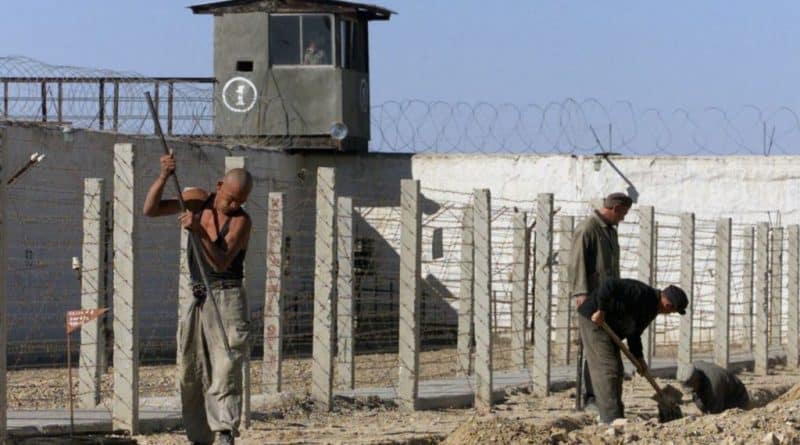Uzbekistan: tens of thousands of prisoners are held in inhuman conditions
Helsinki Foundation for Human Rights (HFHR, Poland) actively promotes the development of civil society in Uzbekistan. A significant result of interaction with activists was the monitoring of human rights in prisons. Recently, human rights activists began to distribute a leaflet “COVID-19 in prison. Prevention and protection of rights”, which was prepared by the foundation. The program coordinator of the organization, Lubov Krasnitskaya, shared her vision concerning the situation in the prison system of Uzbekistan with ACCA.
– How do you personally assess the facts presented in the report?
– With great regret, we have to state that the problematic issues of the penitentiary systems of Central Asian countries are approximately the same. Uzbekistan is not an exception. In preparing the report, we got added evidence that degrading treatment by the administration of correctional institutions, inhuman living and working conditions of convicts, corruption and, even worse, mental and physical forms of violence, including torture, affect absolutely everyone in places of deprivation of liberty, and not a separate group.
Regrettably, it should be noted that these are not single facts, but tens of thousands of convicts who have served or are still serving their sentences. A great moral burden also lies on their families, who experience the side effect of the penitentiary system not only during the time, when their relatives are serving their sentences, but also after their release. In fact, it is the relatives and friends who, instead of state bodies, carry out the re-socialization of former prisoners.
As we noted in our monitoring report, the purpose of all penitentiary systems is to punish criminal behavior, but many of them also seek to perform other functions, primarily rehabilitation, helping the offender to return to society and preventing repeated violation of the law. The prison system of Uzbekistan, unfortunately, stands out for its punitive approach, lack of opportunities to undergo training or rehabilitation, inhumane conditions and practices aimed at humiliating and dehumanizing prisoners.
– How did the terrifying figures and facts of the report change your perception of Uzbekistan before and after the work on the report?
– Recently, as a souvenir from Uzbekistan, I received a clay figurine of an old person in a traditional Uzbek dress with lepeshka (traditional bread) in his hands. It would seem that such a small souvenir can be a wonderful reminder of the hospitality and good nature of the Uzbeks, delicious oriental cuisine and fragrant fruits grown in the sunshine. But unfortunately, the history of this figurine is very sad. It is made by persons serving a sentence for a criminal offense in one of the country’s colonies. Despite the state of health, convicts try to get paid work in the colony in order to earn at least some money that can be spent on food in a special store in the colony and thereby at least somehow diversify their diet. At the factory, it’s possible to take a shower and tidy up much more often than those who don’t work. The sanitary conditions of the places of deprivation of liberty, as the results of the report show, require cardinal improvements.
– How difficult was it to collect information about prisoners?
– On the one hand, we are faced with the problem of obtaining official data from government bodies. For example, in the public domain there is no official statistics on the number of people serving sentences in places of deprivation of liberty, divided by demographic indicators. We were also denied data on the number and type of correctional facilities in the country. On the other hand, it is worth noting the willingness of former convicts and their relatives to communicate with our experts. Despite the fact that the content of the conversations and the memories of the years spent in captivity were very sad and sometimes terrifying. In some way, these conversations had a therapeutic effect for the respondents.
– By what kind of criteria do you evaluate the activities of the initiative groups and individual activists to protect the rights of prisoners?
– This question is not correct. We are not a control body to evaluate someone else’s work. We are exactly the same human rights organization as initiative groups or national organizations in other countries. A huge amount of knowledge and experience has been accumulated during the work of our foundation in the field of human rights monitoring, therefore the activity is aimed not only at monitoring the observance of human rights by authorities in Poland, but also at sharing our experience in other countries through educational events, internships, exchange visits.
– How can HFHR and international organizations help to promote reforms in the prison system? And are the authorities of Uzbekistan ready for such assistance?
– Helsinki Foundation has 30 years of experience in human rights education for lawyers, human rights defenders, and government officials. Our specialists have experience in conducting educational programs for prison staff in many post-Soviet countries – Russia, Georgia, and Tajikistan. Once, in the distant 90s, the Uzbek representatives also participated in our trainings.
We and other international organizations are open for cooperation. I note that, on an ongoing basis, we are ready to share our experience in reforming the prison system from the point of view of international standards. For example, in Uzbekistan, we can offer training for employees, who are involved in the Ombudsman+ mechanism, which has been operating recently in Uzbekistan. Are the authorities ready for cooperation? It seems to me that this question is more appropriate to address to the authorities. As an example, I’ll tell you that much more people want to get to our educational events for police officers in Poland than we can provide seats.




